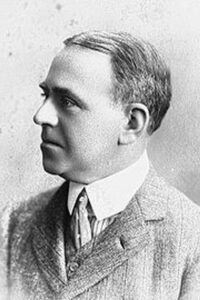
The Double Four
“The traditions of your race, Mr. Ruff,” he said, “are easily manifest in you. Now, hear our decision. Your wife shall be restored to you when you take up this position to which you have become entitled. Sit down and listen.”
Peter Ruff was a rebel at heart, but he felt the grip of iron.
“During these four years when you, my friend, have been growing turnips and shooting your game, events in the world have marched, new powers have come into being, and a new page of history has been opened. As everything that has good at the heart evolves toward the good, we of the Double Four have lifted our great enterprise onto a higher plane. The world of criminals is still at our beck and call; we still claim the right to draw the line between moral theft and immoral honesty, but today, the Double Four is concerned with greater things. I tell you a splendid secret within the four walls of this room, within the hearing of these my brothers, whose fidelity is as sure as the stones of Paris. The Government of our country has craved our aid and the aid of our organization. It is no longer the wealth of the world alone which we may control, but the actual destinies of nations.”
“What I suppose you mean to say is,” Peter Ruff remarked, “that you’ve been going in for politics?”
“You put it crudely, my English bulldog,” Sogrange answered, “but you are right. We are occupied now by affairs of international importance. More than once during the last few months, ours has been the hand which has changed the policy of an empire.”
“Most interesting,” Peter Ruff declared, “but so far as I am concerned——”
“Listen,” the Marquis interrupted. “Not a hundred yards from the French Embassy in London, there is waiting for you a house and servants no less magnificent than the Embassy itself. You will become the ambassador of the Double Four in London, the titular head of our association, a personage whose power is second to none in your marvellous city. I do not address words of caution to you, my friend, because we have satisfied ourselves with your character and capacity before we consented to your occupying your present position. But I ask you to remember this: the will of Madame lives even beyond the grave—the spirit which animated her when alive breathes still in all of us. In London, you will wield a great power. Use it for the common good. And remember this: the Double Four has never failed, the Double Four can never fail.”
Read or download Book
E. Phillips Oppenheim
Edward Phillips Oppenheim (22 October 1866 – 3 February 1946) was an English novelist, and a prolific writer of best-selling genre fiction, featuring glamorous characters, international intrigue, and fast action. Notably easy to read, they were viewed as popular entertainment. He was featured on the cover of Time magazine in 1927.
Biography
Edward Phillips Oppenheim was born on 22 October 1866 in Tottenham, London, the son of Henrietta Susannah Temperley Budd and Edward John Oppenheim, a leather merchant. After attending Wyggeston Grammar School until the sixth form in 1883, his family’s finances forced him to withdraw and he worked in his father’s business for almost twenty years. His father subsidized the publication of his first novel, which proved just successful enough to break even. He published five of his novels between 1908 and 1912 under the pseudonym “Anthony Partridge”.
Around 1900, Julien Stevens Ulman (1865–1920), a wealthy New York leather merchant who enjoyed Oppenheim’s books, bought the leather works and made him a salaried director to support his writing career.
He quickly found a successful formula and established his reputation. In 1913, John Buchan, launching his career as a suspense novelist, called Oppenheim “my master in fiction” and “the greatest Jewish writer since Isaiah”. As early as that year, his publishers were bringing out new editions of some of his earlier works to meet, in the words of one trade publication, “the insatiable demand of the public for more stories by him”. It added: “Readers of the author’s recent books will find these first stories of life sketches full of interest, their very crudeness being positively amusing in light of his present finished craftsmanship.”
In 1892 Oppenheim married an American, Elise Clara Hopkins of Easthampton, Massachusetts. They lived in Evington, Leicestershire in what is now The Cedars pub until the First World War and had one daughter. During that war, he worked for the Ministry of Information.
He described his method in 1922: “I create one more or less interesting personality, try to think of some dramatic situation in which he or she might be placed, and use that as the opening of a nebulous chain of events.” He never used an outline: “My characters would resent it.” When he needed villains for his diplomatic and political intrigues he drew on Prussian militarists and anarchists, enough for one reviewer to lament “the baldness of his propaganda”. For example, in A People’s Man (1915), a socialist discovers that his movement is secretly run by German spies.
A 1927 review in The New York Times said he “numbers his admirers in the hundreds of thousands and has one or more of his books on a prominent shelf in almost every home one enters”. He appeared on the cover of Time magazine on 12 September of that same year.
Reviews for his work treated them as entertainment with only a slight relationship to the mystery genre. In 1933, a review of Crooks in the Sunshine explained that “Mr. Oppenheim’s crooks are so polished that they have no difficulty in moving in the very best society…. There is very little mystery in this book, but there is dress-suit crime galore.” In 1936, a review of A Magnificent Hoax, his one-hundredth novel, said: “The hoax is on the reader, who is led, through nearly 300 pages, only to find that nothing very terrible has happened. The explanation takes a bit of believing, but since it extricates several very nice people from what looks like a nasty mess, one is willing to let that pass.” The Shy Plutocrat, published early in World War II, was “a good tale to take your mind off your worries”. Readers came to expect familiar themes, “the peculiar Oppenheim blend of dispatch-box atmosphere, femmes fatales, double traitors, and a tight plot”. In mid-career, The Great Impersonation (1920) was called “his best work”.
Along with dozens of novel and short story collections, he produced an autobiography, The Pool of Memory, in 1942.
Oppenheim’s literary success enabled him to buy a villa on the French Riviera and a yacht, then a house in Guernsey, though he lost access to this during the Second World War. He regained the house, Le Vauquiedor Manor in St. Martins, after the war and died there on 3 February 1946. His wife died there on 25 November.
An assessment that appeared in The New York Times upon his death said: “As he recalls in his pleasant and modest autobiography, all his books were easy to write. They were equally easy to read, especially on a summer vacation when escapist literature is most welcome.” He composed by dictating to a secretary and once produced seven works in a single year. His social set included the characters that populated his novels, where he created “a glamorous world of international intrigue, romance, and plushy society galloping along in swift action and suspense”. One academic study calls him “a talented entertainer”.






